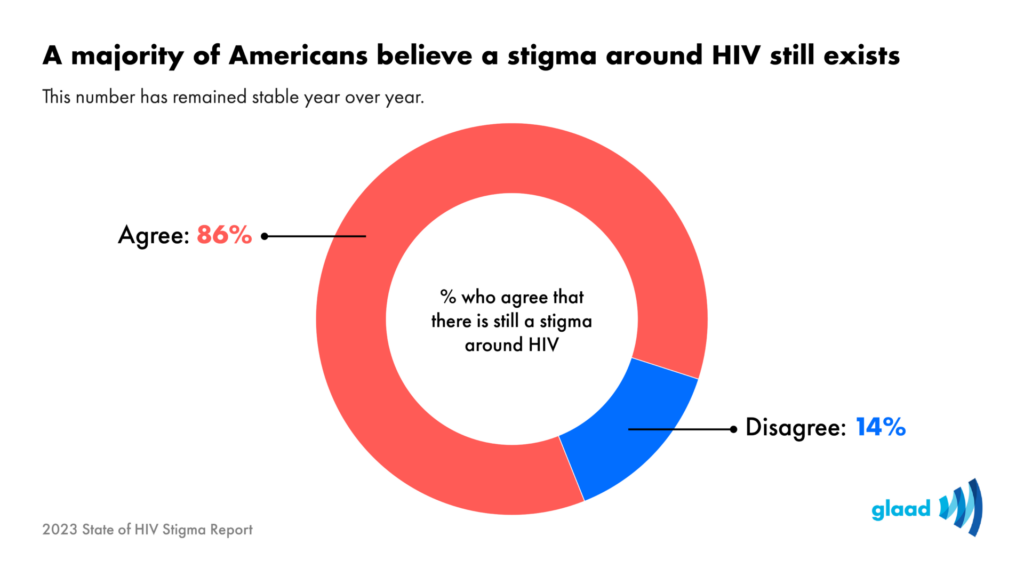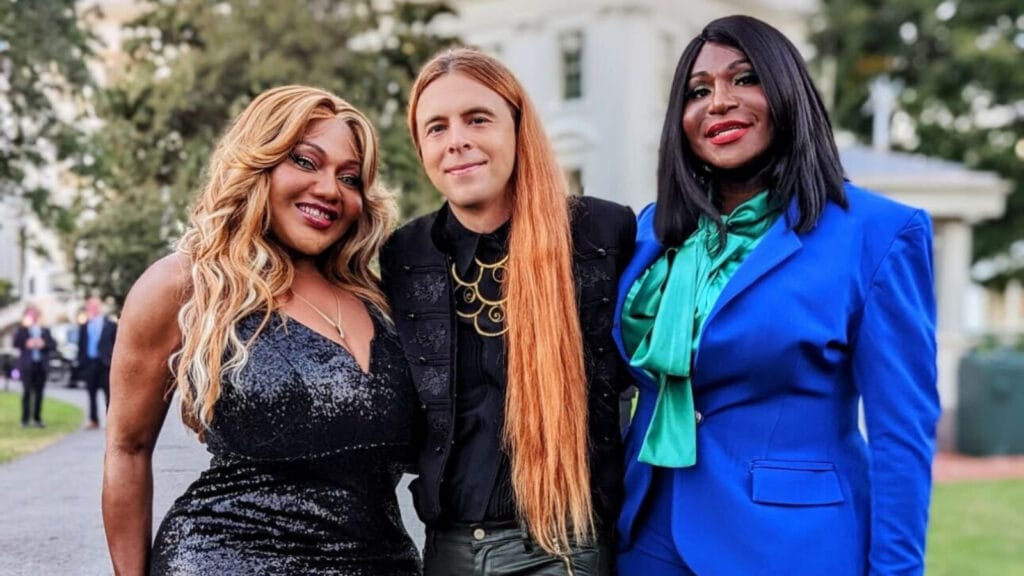CDC Data shows that the U.S. South currently has the highest rates of new HIV diagnoses, exacerbated and complicated by systemic and historic racism, poverty, and healthcare inequities.
In fact, GLAAD research affirms those findings and reiterates that one top of systematic challenges, supermajorities of Americans believe HIV stigma still very much exists.

In partnership with the Gilead COMPASS Initiative, here’s a look at the realities, wins and challenges our grassroots partners are facing in their communities, from Texas to Florida and Alabama, among others.
Ian L. Haddock
Founder & Executive Director, The Normal Anomaly Initiative, Houston, Texas
“Honestly, I believe we have most of the tools to end the HIV epidemic; we recognize that HIV is the symptom of a much larger structural issue. The difficulty we experience as an organization is being under-resourced to impact the larger structural issues contributing to higher transmission rates amongst our focused community. Black, queer people are experiencing difficulties in not just health but also in racial, social, economic, political, and personal spaces. So, if we want to end the epidemic, prevention and care will result from us assisting communities to have better jobs, safer transportation, higher self-esteem, and more joy. Prevention and care won’t be a priority until basic needs are met. “

“This year, we have been overwhelmed with the love of our community, and we are more clear than ever that we are a necessary entity within the Southern United States. One of our big moments this year was being featured on The Jennifer Hudson Show for World AIDS Day 2023—an incredible experience for us that highlighted our organization on a powerful platform. We are also elated to serve more people in person as we have Houston’s only standalone Black LGBTQ+-led and focused space that we have recently acquired. Finally, we are grateful to be working with the HIV Prevention Trials Network Building Equity Through Advocacy in their Peer Support component, which has formally extended our work to Dallas, Texas.
We are also developing a leadership development intervention for their Health Equity component, expanding us from Texas across the Southern United States into Memphis, TN, Atlanta, GA, Montgomery, AL, and South Florida.”
Shakita Jones,
Founder & Executive Director, Central Alabama Alliance Resource & Advocacy Center (CAARAC),
Montgomery, Alabama
“Being a small organization, finding unrestricted financial support that will allow us to serve communities in a culturally inclusive and responsive way has been a barrier for us. Restrictions on serving food, having social events, incentives, etc., are barriers to us. For example, we recently received a grant from the Alabama Department of Public Health (ADPH) for a program. We can only buy nutritional snacks and water. We can’t pay for a stage for presenters or offer meals/refreshments for the conference we are hosting because that is seen as entertainment. Our program is for Black college students, mainly from Alabama State University. We are hosting them for 3-4 hours on a Friday night, and we can’t buy them dinner. So, we have to get people in the community to donate food for meals. Also the most significant barrier with this funding is it’s a reimbursable grant. That means we must spend the money first and then get reimbursed. The financial side is hurting us and needs to be more sustainable for small, grassroots organizations.
We started Girls Night Out, a sexual behavioral health program for Black college-aged women to discuss sexuality, power, trauma, mental health, etc. It started with just some intergenerational women getting together at our office for National Women and Girls HIV Day and having candid conversations about sex and HIV prevention. It has grown substantially, and older and younger women in the community have supported it to the point that I had to seek funding to sustain it. That is why I wrote the grant for ADPH.”

“Another win this year is that we are the Health Equity Liaison Organization in Montgomery for the HPTN 096 Building Equity Through Advocacy study. We host the local Onyx Coalition, formed to address the social determinants of health of Black gay men in the community. We serve as one of the lead implementing partners in building, supporting, coordinating, and managing a community coalition in our community. This multi-sectoral coalition works towards the common goal of going beyond individual-level factors to address the social and structural forces that impede access to prevention and treatment tools for Black same gender loving men in Montgomery. It is a diverse coalition of community stakeholders from many organizations and businesses.
Lastly, another win is that we expanded our location in Wetumpka. Wetumpka is our original location, and it was very small. When we started working with the coalition, we opened an office in Montgomery. Since we have increased programming and hope to expand more work in 2024, our generous landlord in Wetumpka offered us more space for our growth at a deal that we could not pass up. 2023 has been good to CAARAC, and we hope it gets even better.”
Nic Zantop,
Deputy Director, Transinclusive Group,
Wilton Manors, FL
“As we think about the landscape of HIV care and prevention, we understand the importance of knowing your HIV status, meeting people where they are, and working to fight stigma. We also know that regardless of HIV status, if a person’s total, holistic needs aren’t met, and they’re not treated with respect and dignity, health and well-being are impacted. People need secure housing, nutritious food, social and mental health support, community connection, safety from violence and discrimination, and so much more. These are more than just social determinants of health — they are basic human rights. As our communities face an epidemic of transphobic violence and state-sanctioned discrimination, a profound lack of affordable housing, and so many more threats, we believe HIV prevention and care means taking on these systemic injustices as well.
We are strong proponents of the status-neutral approach to care and prevention, which emphasizes addressing everyone’s health and social service needs and prioritizes these holistic needs above HIV status, reducing stigma and ensuring everyone gets equitable support and care. While the adoption of a status-neutral approach to HIV prevention and care is gaining momentum, the process of reshaping under-resourced systems, which largely function in silos, is slow. Coupled with ongoing legislative and policy efforts to restrict access to gender-affirming healthcare in states like Florida, organizations like ours are confronting numerous barriers our siblings face when accessing healthcare, housing, education, and employment. As a grassroots, trans-led organization in the South, operating during a time of unprecedented attacks on the existence, healthcare, rights, and protections of transgender people, the challenges are numerous, but we remain committed to centering and empowering our community.”

“In states like Florida, where transgender and LGBTQ+ people are faced with so many threats and our rights seem to be under attack constantly, it’s important to acknowledge our wins and center the power of trans joy. A win for Transinclusive can look like so many different things. It’s coming together as a community for town hall events, shared meals, and peer-support meetings. It’s making sure our siblings have access to transportation to get them safely to their destinations. It’s providing mutual aid support to help with unforeseen expenses. Wins look different every day, with some big and some small, and it’s vital that we celebrate every one of them.
In 2023, we were proud to become the first transgender-led organization named as a beneficiary of the Florida AIDS Walk, a major fundraising event organized by AIDS Healthcare Foundation. The Florida AIDS Walk doubles the support of donors to organizations like ours that are fighting HIV stigma and working to ensure equitable access to vital services, support, and resources for our community in South Florida. We’re excited to share that we’ll be a returning beneficiary of the 2024 Florida AIDS Walk and invite everyone to join our efforts.”
Daniel J. Downer
Executive Director, Bros in Convo Initiative
Orlando, Florida
“There are many challenges that we face as grassroots organizations providing crucial HIV services to gay and queer communities of color in Central Florida. Major challenges include limited capacity due to small team sizes, restrictions on funding often specific to programs rather than general operating support for additional positions, and exclusion from various levels of government HIV funding opportunities. Despite these challenges, our organization has remained dedicated to its mission, being resourceful with limited resources and doing the work towards ending the HIV epidemic in the Orlando Metropolitan Statistical Area (MSA).
In the past year, our organization has achieved significant success in promoting HIV awareness and connecting individuals to care and prevention services, accomplished through community vaccination clinics in collaboration with the Florida Department of Health Orange County, as well as non-traditional HIV testing hours in partnership with Miracle of Love Inc., which extended into late evenings and weekends.”

“Additionally, we launched a harm reduction program in collaboration with Miracle of Love Inc., specifically addressing cannabis use among Men who have Sex with Men (MSM) during sexual encounters. This initiative reflects a comprehensive approach to health promotion and risk reduction.
Moreover, our organization has taken steps to enhance health literacy among Transgender, Gender Non-Conforming, and Non-Binary (TGNCNB) individuals accessing local health services. This effort extends to creating health literacy guides for the TGNCNB community and local healthcare providers who serve this population. Collectively, these initiatives represent a commitment to inclusive and accessible healthcare for diverse communities.”













